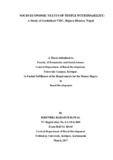Please use this identifier to cite or link to this item:
https://elibrary.tucl.edu.np/handle/123456789/2312| Title: | Socio-Economic Status of People With Disability: A Study of Gudukhati Vdc, Bajura District, Nepal |
| Authors: | Rawal, Birendra Bahadur |
| Keywords: | Socio-economic status;Social status;Disabled persons |
| Issue Date: | 2017 |
| Publisher: | Central Department of Rural Development Tribhuvan University, Kathmandu |
| Abstract: | This is a micro level study of Gudukhati VDC of Bajura district to see the Socio- economic Status of People with Disability in the study area. People with Disabilities (PWDs) are one of the marginalized groups in Nepal. Few researches exploring situation of PWDs have shown that disabled people are experiencing stigma and discrimination in the society. This conducted research mainly aims to dig-out the real condition of PWDs in the society. It has objectives to assess the social and economic status of PWDs along with discovering the existing opportunities and potentialities at local level and study the social and family behavior upon them. The research is based on descriptive research design to ease researcher in collecting information about socio-economic status of disabled people. For data collection, mostly qualitative technique was used to explore social and family behavior towards the disabled people which would help to know their status in society and own family. The data were gathered from both quantitative and qualitative nature. Similarly, both primary and secondary data were used in this study. Primary data were collected through household survey, observation, FGD and interview. The various internal and external sources used for acquire the secondary data. However, quantitative technique also used to identify the income, education and livelihood status of disabled people in the study area The research found that, most of the PWDs were found to be from the households with agriculture as the primary means of livelihood. Majority 45% of the disabled people in Gudukhati VDC had speech and hearing disability. None of them are found to have received training on sign language. Majority of disabled people are dependent on their family members for daily living. Only 15% PWDs are able to engage in income earning activities, which have improved their socio economic status. They are living under the basic facilities. However, almost all of them are deprived from education and income earning opportunities Majority 70% of the PWDs were disabled by birth where it is found that need of pregnancy care of mother to prevent disabled. Furthermore, the study has also explored information on possibilities and potentialities of the PWDs and seeks possible recommendations to uplift their socio- economic status. |
| URI: | http://elibrary.tucl.edu.np/handle/123456789/2312 |
| Appears in Collections: | Rural Development |
Items in DSpace are protected by copyright, with all rights reserved, unless otherwise indicated.

